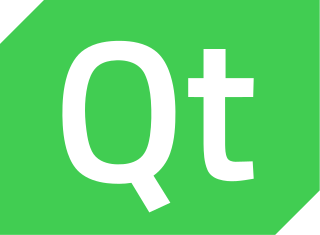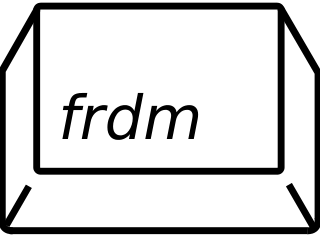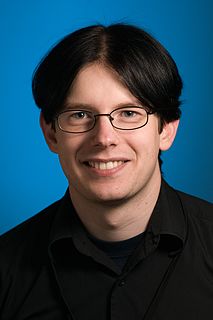The Artistic License is a software license used for certain free and open-source software packages, most notably the standard implementation of the Perl programming language and most CPAN modules, which are dual-licensed under the Artistic License and the GNU General Public License (GPL).

Qt is a free and open-source widget toolkit for creating graphical user interfaces as well as cross-platform applications that run on various software and hardware platforms such as Linux, Windows, macOS, Android or embedded systems with little or no change in the underlying codebase while still being a native application with native capabilities and speed. Qt is currently being developed by The Qt Company, a publicly listed company, and the Qt Project under open-source governance, involving individual developers and organizations working to advance Qt. Qt is available under both commercial licenses and open source GPL 2.0, GPL 3.0, and LGPL 3.0 licenses.
The Open Software License (OSL) is a software license created by Lawrence Rosen. The Open Source Initiative (OSI) has certified it as an open-source license, but the Debian project judged version 1.1 to be incompatible with the DFSG. The OSL is a copyleft license, with a termination clause triggered by filing a lawsuit alleging patent infringement.

BusyBox is a software suite that provides several Unix utilities in a single executable file. It runs in a variety of POSIX environments such as Linux, Android, and FreeBSD, although many of the tools it provides are designed to work with interfaces provided by the Linux kernel. It was specifically created for embedded operating systems with very limited resources. The authors dubbed it "The Swiss Army knife of Embedded Linux", as the single executable replaces basic functions of more than 300 common commands. It is released as free software under the terms of the GNU General Public License, version 2.
The SCO–Linux disputes are a series of legal and public disputes between the software company SCO Group (SCO) and various Linux vendors and users. The SCO Group alleges that its license agreements with IBM means that source code that IBM wrote and donated to be incorporated into Linux was added in violation of SCO's contractual rights. Members of the Linux community disagree with SCO's claims; IBM, Novell and Red Hat have ongoing claims against SCO.
The Common Development and Distribution License (CDDL) is a free and open-source software license, produced by Sun Microsystems, based on the Mozilla Public License (MPL). Files licensed under the CDDL can be combined with files licensed under other licenses, whether open source or proprietary. In 2005 the Open Source Initiative approved the license. The Free Software Foundation (FSF) considers it a free software license, but one which is incompatible with the GNU General Public License (GPL).

The Software Freedom Law Center (SFLC) is an organization that provides pro bono legal representation and related services to not-for-profit developers of free software/open source software. It was launched in February 2005 with Eben Moglen as chairman. Initial funding of US$4 million was pledged by Open Source Development Labs.

Free and open-source software (FOSS) is software that can be classified as both free software and open-source software. That is, anyone is freely licensed to use, copy, study, and change the software in any way, and the source code is openly shared so that people are encouraged to voluntarily improve the design of the software. This is in contrast to proprietary software, where the software is under restrictive copyright licensing and the source code is usually hidden from the users.

Linux-based devices or Linux devices are computer appliances that are powered by the Linux kernel and possibly parts of the GNU operating system. Device manufacturers' reasons to use Linux may be various: low cost, security, stability, scalability or customizability. Many original equipment manufacturers use free and open source software to brand their products. Community maintained Linux devices are also available.

Skype Technologies S.A.R.L is a telecommunications company headquartered in Luxembourg City, Luxembourg and Palo Alto, CA, United States, whose chief business is the manufacturing and marketing of the video chat and instant messaging computer software program Skype, and various Internet telephony services associated with it. Microsoft purchased the company in 2011, and it has since then operated as their wholly owned subsidiary; as of 2016, it is operating as part of Microsoft's Office Product Group. The company is a Société à responsabilité limitée, or SARL, equivalent to an American limited liability company.

Harald Welte is a programmer.
MacTheRipper is a Mac OS X application that enables users to create a playable copy of the contents of a Video DVD by defeating the Content Scramble System. During this process it may optionally modify or disable the DVD region code or the User operation prohibition features of the copied data. The previous lack of an OS X equivalent to the PC software DVDShrink gave this standalone DVD ripper widespread popularity among Macintosh users.

The gpl-violations.org is a not-for-profit project founded and led by Harald Welte in 2004. It worked to make sure software licensed under the GNU General Public License was not used in ways prohibited by the license.
This is a comparison of free and open-source software licenses. The comparison only covers software licenses with a linked article for details, approved by at least one expert group at the FSF, the OSI, the Debian project or the Fedora project. For a list of licenses not specifically intended for software, see List of free content licenses.
License compatibility is a legal framework that allows for pieces of software with different software licenses to be distributed together. The need for such a framework arises because the different licenses can contain contradictory requirements, rendering it impossible to legally combine source code from separately-licensed software in order to create and publish a new program. Proprietary licenses are generally program-specific and incompatible; authors must negotiate to combine code. Copyleft licenses are deliberately incompatible with proprietary licenses, in order to prevent copyleft software from being re-licensed under a proprietary license, turning it into proprietary software. Many copyleft licenses explicitly allow relicensing under some other copyleft licenses. Permissive licenses are compatible with everything, including proprietary licenses; there is thus no guarantee that all derived works will remain under a permissive license.

A free-software license is a notice that grants the recipient of a piece of software extensive rights to modify and redistribute that software. These actions are usually prohibited by copyright law, but the rights-holder of a piece of software can remove these restrictions by accompanying the software with a software license which grants the recipient these rights. Software using such a license is free software as conferred by the copyright holder. Free-software licenses are applied to software in source code and also binary object-code form, as the copyright law recognizes both forms.

Copyleft, distinguished from copyright, is the practice of offering people the right to freely distribute copies and modified versions of a work with the stipulation that the same rights be preserved in derivative works created later. Copyleft software licenses are considered protective or reciprocal, as contrasted with permissive free-software licenses.

The GNU General Public License is a widely used free software license that guarantees end users the freedom to run, study, share, and modify the software. The license was originally written by Richard Stallman, former head of the Free Software Foundation (FSF), for the GNU Project, and grants the recipients of a computer program the rights of the Free Software Definition. The GPL is a copyleft license, which means that derivative work must be distributed under the same or equivalent license terms. This is in distinction to permissive software licenses, of which the BSD licenses and the MIT License are widely-used less-restrictive examples. GPL was the first copyleft license for general use.
The Free Software Foundation (FSF) is a 501(c)(3) non-profit organization founded by Richard Stallman on 4 October 1985 to support the free software movement, which promotes the universal freedom to study, distribute, create, and modify computer software, with the organization's preference for software being distributed under copyleft terms, such as with its own GNU General Public License. The FSF was incorporated in Massachusetts, US, where it is also based.

Software Freedom Conservancy is an organization that provides a non-profit home and infrastructure support, including legal services, for free/open source software projects. The organization was established in 2006, with the help of the Software Freedom Law Center (SFLC). As of June 2018, the organization had over 40 member projects.











